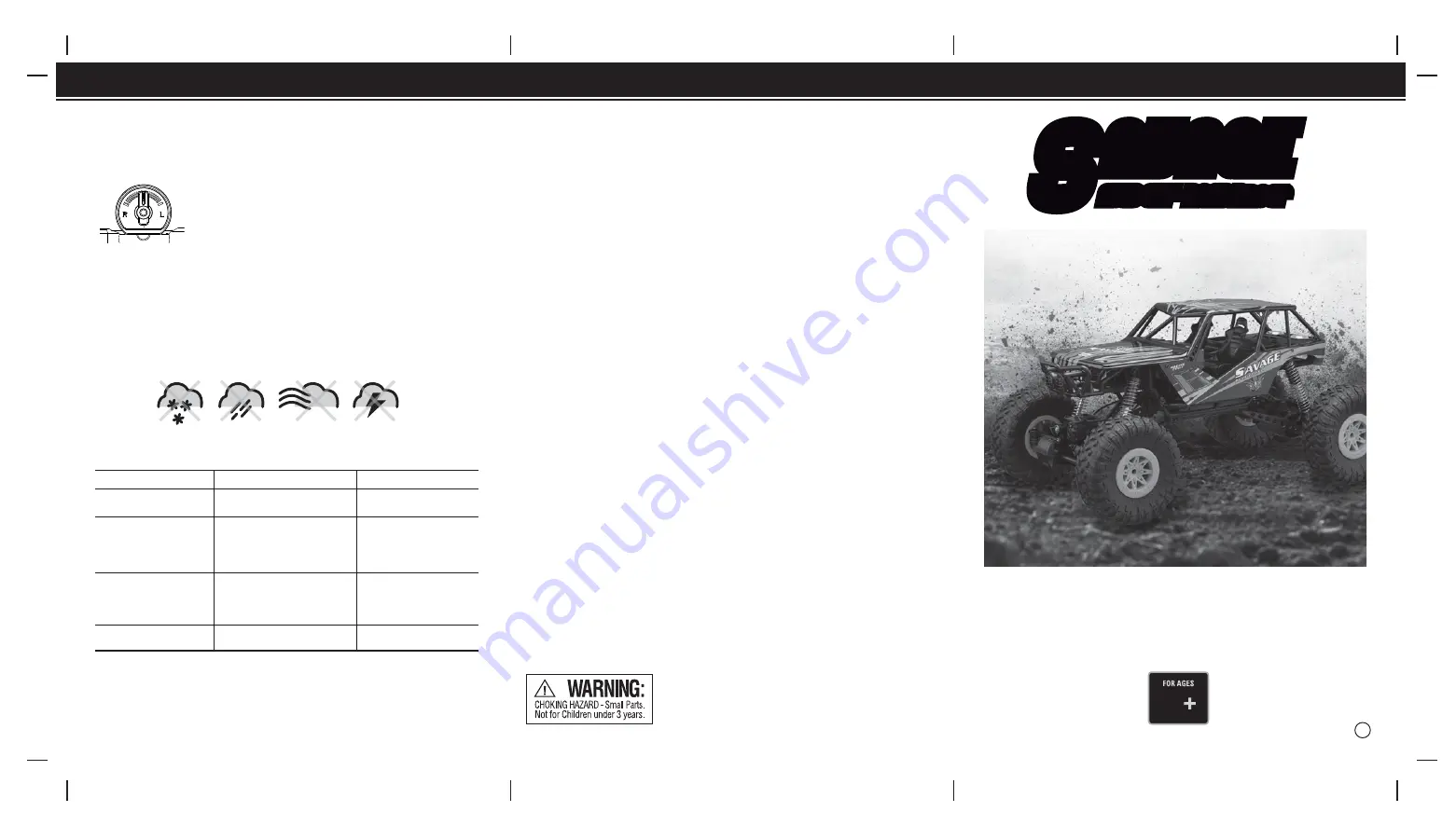
WARNING
DO NOT USE CAR IN INCLIMATE WEATHER!
TROUBLESHOOTING
Before sending your car in for repair, please check for a solution below.
Problem
Car will not move.
Car does not respond properly to
remote control.
Car loses connection to remote control.
Car battery has fully charged, but
slower than normal.
Possible Cause(s)
Weak batteries; no batteries
Car and remote not synced properly
Another RC car may be transmitting on the same
radio frequency
Using car in a small enclosed area
Using car indoors
Low batteries in transmitter or vehicle
Driving car for too long at high speeds, causing
motor to overheat
Solution
Install new batteries in remote control and
recharge the car battery.
Refer to sync section and resync your car and
remote.
Move to a new location where no other RC cars
are present.
Move outdoors to a large open area.
Install new batteries in remote control or
recharge your car.
Turn car off for 10-15 minutes.
Thank you for choosing SAVAGE
TM
. With proper care, your new
SAVAGE
TM
will provide you with many hours of enjoyment. Please read this
instruction manual completely before using the product for the first time, and then
keep this manual in a handy place for future reference.
Colors and styles may slightly vary.
8
INSTRUCTION MANUAL
Made in China
Conforms to safety requirements of FCC.
PROPEL RC™ and Savage™ are trademarks of Rooftop Brands.
8619 Wall street, Suite 400, Austin, TX 78754
© 2019 Rooftop Brands™. All Rights Reserved. www.propelrc.com.
BC
TM
AWD
OFF-ROAD
Racer
AVAGE
s
STEERING WHEEL TRIM ADJUSTMENT
SAFETY WARNINGS!
•
Improper use of batteries may lead to overheating, breakage or leaking.
-
Do not mix old and new batteries.
-
Do not mix different battery brands.
-
Install batteries with correct polarity. The flat side (negative terminal) of the battery should rest
against the spring.
-
Remove dead batteries immediately.
-
Avoid liquids, which can short circuit the batteries.
-
The truck or remote will become unresponsive when batteries are low, at which point you should replace
all batteries with new ones.
-
Remove the batteries if you will not use the truck for a long time.
•
Avoid using near furniture or glass to prevent damage to these objects.
•
Do not play on roads.
•
Do not play in crowded areas to avoid injury or damage. Choose a safe location away from traffic.
•
Do not use truck during a storm or when lightning or thunder are present.
•
Do not use in a wet , sandy or muddy environment as truck may become damaged.
•
Do not modify or attempt to replace the built-in original antenna on the remote or truck. Doing so will damage the
set and affect operation.
• Do not pull on any wires that are part of the truck. Such action may cause the wires to break and the truck
to malfunction.
• Keep fingers, hair and clothes away from the truck’s spinning tires. Failure to do so may result in
physical injury.
• Never aim the truck at other people.
• Do not throw the truck or purposely hit it with any object.
• Store truck in a cool environment, away from high-temperature sources such as fires, stoves, radiators, etc.
• This truck has no user-serviceable parts. Do not attempt to modify components or circuit board.
FCC Part 15 C Notice
CAUTION:
Changes or modifications not expressly approved by the party responsible for compliance
could void the user’s authority to operate the equipment.
NOTE:
This equipment has been tested and found to comply with the limits for a Class B digital device,
pursuant to Part 15 of the FCC Rules. These limits are designed to provide reasonable protection against
harmful interference in a residential installation. This equipment generates, uses and can radiate radio
frequency energy and, if not installed and used in accordance with the instructions, may cause harmful
interference to radio communications. However, there is no guarantee that interference will not occur in a
particular installation. If this equipment does cause harmful interference to radio or television reception,
which can be determined by turning the equipment off and on, the user is encouraged to try to correct the
interference by one or more of the following measures:
• Reorient or relocate the receiving antenna.
• Increase the separation between the equipment and receiver.
• Connect the equipment into an outlet on a circuit different
from that to which the receiver is connected.
• Consult the dealer or experienced radio/TV technician for help.
This device complies with Part 15 of the FCC Rules. Operation is subject to the following two conditions :
(1) this device may not cause harmful interference, and
(2) this device must accept any interference received, including interference that may cause undesired
operation.
If the Truck can not go forward straightly you may need adjust the
steering wheel trim on the bottom of the truck from time to time
until the truck can go forward straight. (see diagram F)
F


